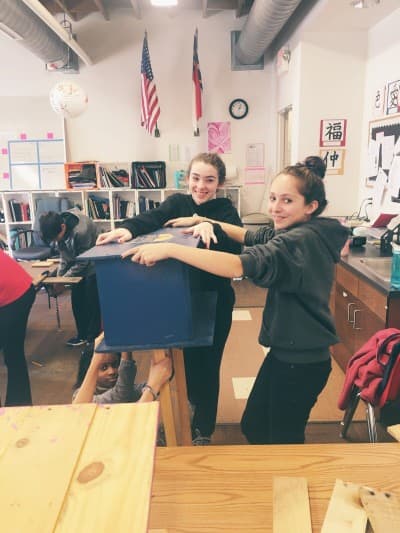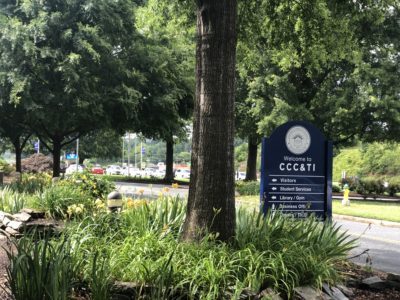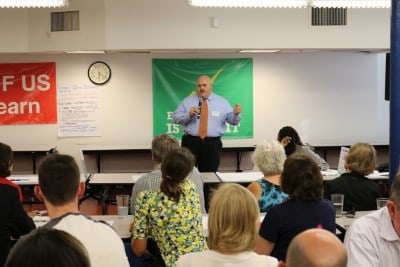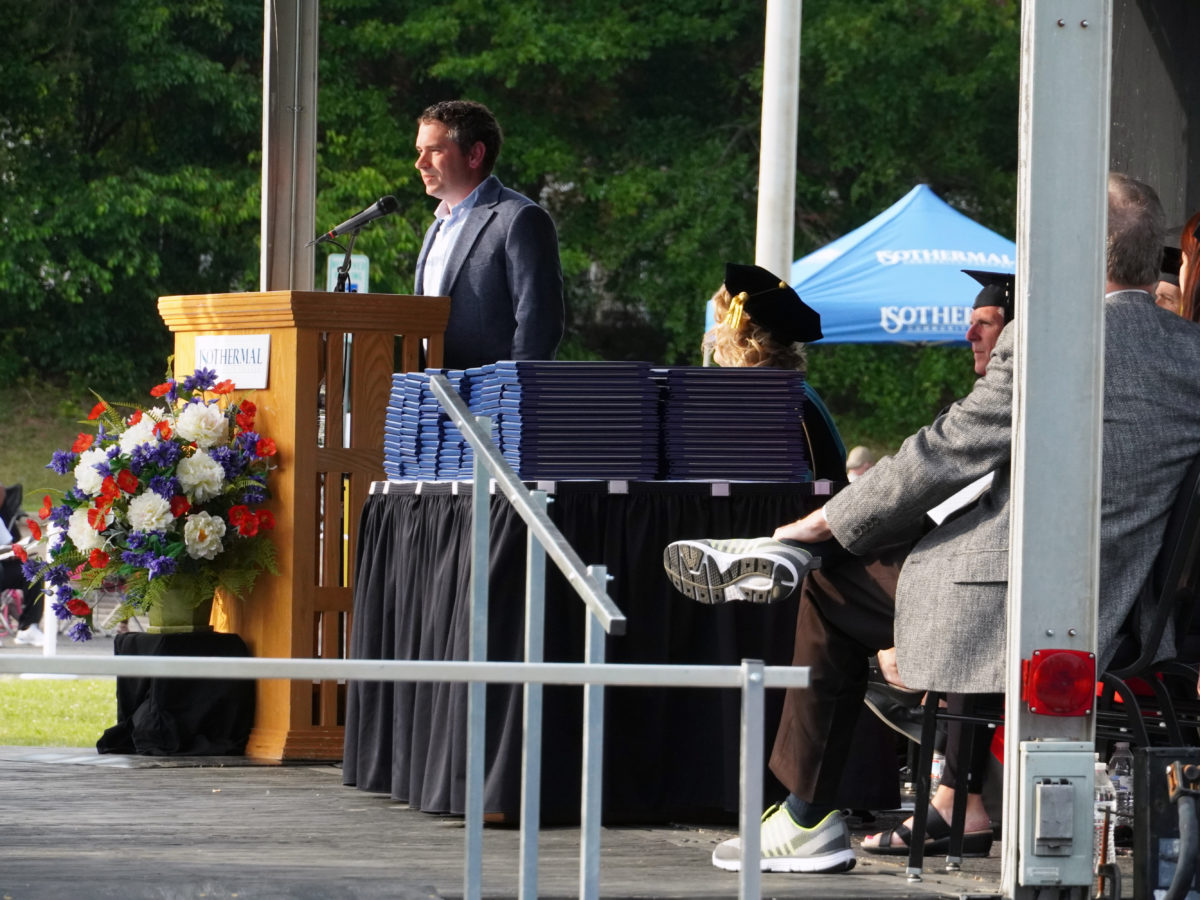
|
|
On a beautiful mid-May evening in Spindale, North Carolina, more than 100 2021 graduates walked the stage to mark the completion of their journey at Isothermal Community College.
I was honored to receive an invitation from Isothermal President Margaret Annunziata and her team to deliver the commencement address. You will find the video and full draft of my remarks below. My thanks to Mike Gavin and the entire Broadcasting and Production Technology faculty and students for the video.
My advice to the students was to move forward with pride, knowing they were community college graduates — and to share the story of community colleges as they do. I shared with them my belief that community colleges are among the most important vehicles for changing economic mobility in this country.
I commended them on their resilience during a school year dominated by a pandemic — noting that my own life story provided me with some lessons that have saved me during my own dark times:
(First), understanding none of this was permanent — even the sadness. Second, finding a purpose in my days anchored me. Third, I needed to surround myself with folks I loved who loved me. And, fourth, I needed room to fail, to fall short of my own high standards, and learn from those mistakes.
I asked them to consider being of service to our rural communities:
It is tempting — as you graduate — to believe success might look like moving away from home, finding a high-paying job, and building a life away from everything you’ve known. And success can look like that for some folks, but my advice to you is to know success can — and should — include staying home, serving your community, and contributing to the good of the entire state.
Rural North Carolina needs people just like you. It needs smart, young, driven people who know that our rural communities can provide opportunities to live, to work, and to play just the same as our cities and suburbs.
It was an honor to remind everyone assembled — and myself — that perhaps our most important mantra in life may well be: I’ll try again tomorrow.
You may read the commencement speech as written or watch the full video of my remarks below.
Remarks as written for delivery for the May 17, 2021, commencement for Isothermal Community College:
It is an honor to be here with all of you this evening.
The long hours, late nights, fitting your school work in between jobs and families and life. All of the work has now added up to officially being a graduate of Isothermal Community College.
For some of you, you are the first in your family to graduate college. That was true for me — and it was a reminder that by graduating I was fulfilling the dreams of my great grandparents, grandparents, and parents who had worked hard, paid their taxes, and hoped that one day someone in their family would have the chance to call themselves a college graduate.
Tonight, you have done the same. I know it wasn’t easy — particularly this year — and you deserve this moment to celebrate your accomplishments.
Congratulations.
I want to share three stories with you this evening: the story of community colleges, a story of resilience, and a story of courage and leadership – your courage and your leadership.
The first point is perhaps the most obvious — all of the students here tonight are part of the millions of Americans every year who attend a two-year community and technical college.
Isothermal is one of our 58 community colleges in North Carolina. Through my job with EdNC, I have been fortunate enough to travel to 45 of those 58.
Dallas Herring, considered by many to be the father of the North Carolina Community College system, famously said the purpose of community colleges is to “take the people where they are, and carry them as far as they can go.”
This powerful sense of purpose is alive and well today. North Carolina’s 58 community colleges meet people where they are — and give them a chance to pursue their dreams.
During my travels I have seen that community colleges are first-class institutions. I’ve seen a world-class photography program at Randolph Community College, I’ve ridden in the big rigs at Caldwell Community College as they prepare student drivers for a great paying career that will change their family’s life dramatically, and I’ve heard of students who faced homelessness, attended an early college, and landed in the Ivy League.
I don’t have to tell you that you received a great education here at Isothermal, because you lived it, but I do often have to remind those who haven’t experienced community colleges recently that they are among the most important tools our country has to change lives.
My friend Mike Krause, who helped lead higher education efforts in Tennessee, recently reminded us: Most people view college through the lens of an 18-year-old student transitioning from high school straight to a four-year college and moving forward from there. This has never been the only path, but it is even more rare today, and it is long past time that our policies and perceptions shift.
Most of you sitting in this crowd as graduates tonight will change jobs multiple times. And community colleges are practically the only institutions of higher learning that can provide you with a credential in eight or 16 weeks that can dramatically change the financial future of your family.
I hope as you go forward that you will recall with pride being a community college graduate — and that you tell others so the “secret” of the value of community colleges will no longer remain a secret.
The second story I want to tell is focused on resilience.
Tonight, you have officially made it through a school year dominated by COVID-19. I do not have to tell you that the experience of the last year was not something you signed up for when you enrolled. You probably anticipated actually attending in-person class with your fellow students, not staring at them through your laptop or phone.
Making it through this year — not just the education part, but the living part — required resilience. Dictionaries will tell you resilience is about bouncing back from challenges. If you can find one on a shelf, pick it up, blow off the dust, and turn to the R’s. The dictionary will say resilience is about toughness, a capacity to move through adversity.
You can use whatever definition you like, but I would encourage you to look to your left and right. Each of you is a living, breathing example of resilience. You lived, and worked, and studied through challenges you may not even have acknowledged yet.
What I’ve learned is that resilience isn’t something you know you have until you are faced with difficulties. In many ways, I believe resilience is something you develop in the face of challenges.
One of the most important lessons in my own life has been the ability to know hard times will come, dark days will arrive, and people I love will face tough battles … but that somehow, against all odds, we will survive — and on the other end of survival, you may well find a pretty good life.
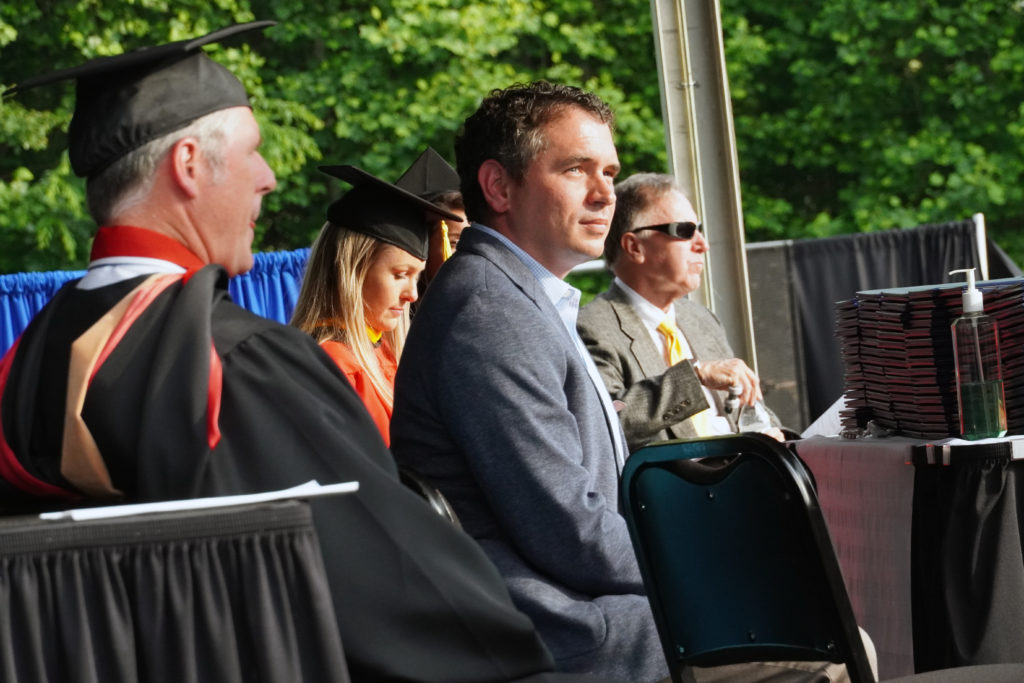
I was born to teenage parents who struggled through addiction. My grandmothers had to help raise me; my aunt and uncle had to adopt me. I went to four different schools across two counties by the time I was in sixth grade. I knew what it was to not always know when and where I would eat again. I saw the perils of addiction in my own family, I lay awake during quiet nights broken up by the sounds of domestic violence, and saw things no kid ought to see.
Once my aunt and uncle adopted me, I did well enough in school. I graduated high school and college, met my future wife, Jamie, fell in love, and started my career. Life was going well, and I thought I knew what the future would hold for me and Jamie — too many pets, a bunch of kids, jobs we loved, and growing old together.
And then eight years ago, my wife died. I was devastated and fell into deep grief. For years I did not know if I would make it to the other end of that grief. For years I wasn’t sure I wanted to make it to the other side.
A few lessons saved me in the end. Understanding none of this was permanent — even the sadness. Second, finding a purpose in my days anchored me. Third, I needed to surround myself with folks I loved who loved me. And, fourth, I needed room to fail, to fall short of my own high standards, and learn from those mistakes.
My hope for you is you will not face these types of challenges in your own life — but some of you already have. You’ve lost parents or siblings. You’ve been counted out. You’ve had adults you thought you could rely on, fail you. And we’ve all lived through this past year.
My final piece of advice for you is to have the courage to find your own way — and to anchor some portion of your life in service.
Life requires a certain amount of courage. We often think of courage as something we show in battle — or something we show in the face of some great evil. I think of it a little differently. When I think of courage I think of a poem by Mary Anne Radmacher who wrote, “Courage doesn’t always roar. Sometimes courage is the little voice at the end of the day that says I’ll try again tomorrow.”
I’ll try again tomorrow.
Those four words serve as a powerful call for us all to remember. On days where we feel like we just can’t win, it is important to know we can try again tomorrow. And, my friends, living that reminder out day in and day out is how you will find your way.
It is tempting — as you graduate — to believe success might look like moving away from home, finding a high-paying job, and building a life away from everything you’ve known. And success can look like that for some folks, but my advice to you is to know success can — and should — include staying home, serving your community, and contributing to the good of the entire state.
Rural North Carolina needs people just like you. It needs smart, young, driven people who know that our rural communities can provide opportunities to live, to work, and to play just the same as our cities and suburbs.
And if you stay here, or move to another rural community, it needs people just like you to resolve to dig in and contribute to making the place where you live a better place for all.
Congratulations once again. You’ve made it through this COVID-19 year. You can move forward knowing you’ve survived. You can move forward without a mask if you’ve been vaccinated. You can move forward knowing that Isothermal Community College has equipped you to live a full life.
Someone very dear to me reminded me of a quote by Anna Quidlen: “Don’t ever confuse the two, your life and your work. That’s what I have to say. The second is only a part of the first … There are thousands of people out there with the same degree you have; when you get a job, there will be thousands of people doing what you want to do for a living. But you are the only person alive who has sole custody of your life. Your particular life. Your entire life. Not just your life at a desk, or your life on the bus, or in the car, or at the computer. Not just the life of your mind, but the life of your heart. Not just your bank account, but your soul … People don’t talk about the soul very much anymore. It’s so much easier to write a résumé than to craft a spirit. But a résumé is cold comfort on a winter night, or when you’re sad, or broke, or lonely, or when you’ve gotten back the chest X ray and it doesn’t look so good, or when the doctor writes ‘prognosis, poor.”
And so, 2021 graduates of Isothermal Community College, I wish for all of you that you will find meaningful work, but mostly I wish for all of you to live meaningful lives full of purpose and love and service. It is your life — and the people who you love — that will save you in the end.
Recommended reading
